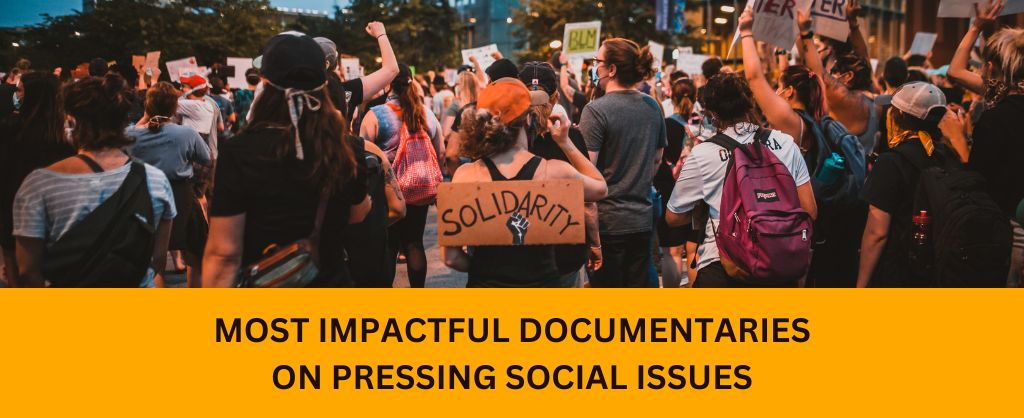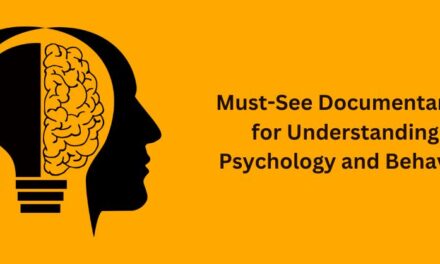10 Most Impactful Documentaries on Pressing Social Issues

Documentaries have become a vital medium for educating the masses on pressing social matters affecting our world.
Unlike fictional narratives, documentaries have the power to bring harsh realities to light and evoke strong reactions in audiences.
Content
- Introduction
- An Inconvenient Truth
- 13th
- Blackfish
- The Act of Killing
- The Invisible War
- The Social Dilemma
- I Am Not Your Negro
- Food, Inc.
- The Square
- Won’t You Be My Neighbor?
- Conclusion
10 Documentaries for Self-Improvement and Personal Growth
Introduction
In this list, we’ve compiled the top 10 documentaries that tackle various social issues head-on, ranging from environmental concerns to social justice movements.
These documentaries inspire us to think critically about the world around us and take action for positive change.
An Inconvenient Truth (2006)
Former vice president Al Gore presents a sobering look at the dangers of climate change in this seminal documentary that sparked wider public engagement with global warming.
Using detailed charts and visuals, Gore breaks down the science behind rising carbon emissions and warns of the catastrophic consequences if bold action isn’t taken soon. While at times excessive in dramatization, An Inconvenient Truth effectively gets the message across and disproves many myths regarding climate change.
Gore’s clarion call paved the way for greater political will to tackle this planetary emergency. The film won two Oscars and became one of the highest grossing documentaries ever.
13th (2016)
Ava DuVernay’s 13th examines systemic racism within America’s prison system and its role in the mass incarceration of African Americans. The film’s title refers to the 13th amendment which abolished slavery except for those convicted of crimes.
DuVernay argues this provision has been continually exploited to deprive black citizens of their rights. She traces the insidious history from slavery through Jim Crow laws, the war on drugs, and the meteoric rise of private prisons.
13th gives salient insights through interviews with activists, politicians, and formerly incarcerated individuals. The documentary makes a powerful case that America’s criminal justice system perpetuates modern-day slavery.
Blackfish (2013)
Gabriela Cowperthwaite’s Blackfish investigates the psychological damage inflicted on captive killer whales at SeaWorld amusement parks that leads them to become violent toward humans.
It focuses on Tilikum, an orca responsible for killing three individuals while under SeaWorld’s care. Interviews with former trainers reveal the trauma and stress whales experience in cramped enclosures separated from their familial pods.
Blackfish also examines the dangers posed by using orcas for entertainment purposes. The documentary sparked intense backlash against SeaWorld’s practices and led them to enact reforms.
The Act of Killing (2012)
Joshua Oppenheimer’s mind-blowing documentary dares to examine the horrors of the Indonesian killings of 1965-66 by getting those responsible to reenact their deeds through cinematic recreations.
With over a million dead in the anti-communist purges, the film focuses on the boastful yet haunted nature of the death squad leaders who carried out executions. The Act of Killing provides chilling insights into their impunity decades later, raising questions of collective memory.
As the reenactments turn darker, the morality of their actions appears to gradually dawn on the killers, resulting in a complex psychological study of guilt, denial, and regret.
The Invisible War (2012)
Kirby Dick’s The Invisible War documents the shocking levels of sexual assault in the U.S. military and the failure to adequately address the victims or prosecute perpetrators.
The film brings together the powerful stories of veterans who recount their assaults by fellow service members with no recourse for justice. It also accuses the military brass of covering up the problem and fostering a culture that enables rape.
The Invisible War helped bring about greater political and public awareness, contributing to reforms by the Department of Defense to better prevent and respond to military sexual trauma.
The Social Dilemma (2020)
Jeff Orlowski’s timely documentary examines the dangerous impacts of social media on society through the very designers and engineers who built these platforms.
From rampant disinformation to political polarization, The Social Dilemma argues the very structure of social media promotes addiction and prioritizes capturing attention over user well-being.
Insider perspectives on the algorithms powering Facebook, YouTube, Instagram, and others reveal how humans have lost control over technology. The documentary conveys an urgent warning about tech monopoly power and the vulnerability of democracy in the social media age.
I Am Not Your Negro (2016)
Raoul Peck’s Oscar-nominated I Am Not Your Negro sets legendary author James Baldwin’s searing critique of American racism to an inventive mix of archival footage, interviews, and Samuel L.
Jackson’s narration of his unpublished writings. Baldwin’s words from decades ago force necessary reflection on racial violence, law enforcement abuses, and civil rights heroes like Medgar Evers and Malcolm X.
I Am Not Your Negro argues Baldwin’s observations seem prophetic today in their diagnosis of white supremacy and vulnerability of black lives. The documentary ensures Baldwin’s incisive voice continues galvanizing antiracism efforts.
Food, Inc. (2008)
Robert Kenner lifts the curtain on America’s morally-bankrupt industrial farming in this shocking exposé. Food, Inc. reveals most meat and produce starts in nightmarish factory farms and processing plants dependent on risky corner-cutting and exploitation of workers.
Interviews with farmers, laborers, and advocates reveal the consolidation of food production into the hands of a few unconcerned corporations.
While focusing on systemic problems, Food, Inc. ends hopefully by highlighting local, sustainable alternatives like farmers markets that allow ethical shopping. The film fostered mass reflection on something often taken for granted – where our food comes from.
The Square (2013)
Jehane Noujaim’s The Square captures the passion and chaos of the Egyptian Revolution through the experiences of protestors in Cairo’s Tahrir Square.
Following key activists from the uprising against Mubarak through Muslim Brotherhood rule and the military coup, it evokes the danger and optimism of the movement. With cinéma vérité intimacy, The Square reveals the struggles in translating democratic ideals into reality.
From triumphant marches to bloody crackdowns, the documentary puts viewers on the emotional journey of Egyptians fighting for freedom at great personal cost.
Won’t You Be My Neighbor? (2018)
This nostalgic film examines Fred Rogers’ gentle yet radical legacy through his beloved TV show Mr. Rogers’ Neighborhood. Using behind-the-scenes footage and interviews with Rogers and family, friends, and crew, it reveals how his warmth and empathy made him a cultural icon.
But it also shows Rogers addressing complex social issues like racism, disability, and grief in ways that challenged children’s preconceptions during divisive times.
Won’t You Be My Neighbor? makes the case that Rogers’ message of kindness and dignity for all remains powerfully countercultural. The documentary made Rogers’ quiet courage more widely appreciated.
Conclusion
The 10 documentaries discussed reveal cinema’s power to bring awareness to social issues, give voice to the marginalized, and spark positive change. They prompt audiences to grapple with realities outside their daily lives.
While inspirational, these films also provoke discomfort at times. But they exemplify documentary filmmaking that informs, challenges, and ultimately mobilizes viewers.
Their creators take bold risks to expose inconvenient truths. Audiences have much to gain from watching high-impact documentaries on subjects of consequence. Their artful storytelling makes society more just, one mind at a time.









